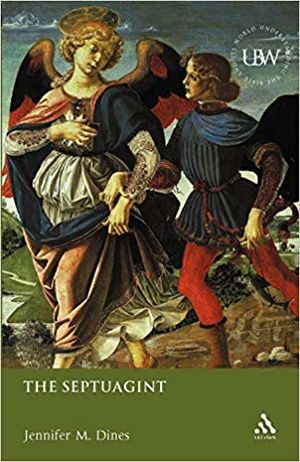The Septuagint (2004 Dines), book
Jennifer M. Dines, The Septuagint (London, and New York: T&T Clark, 2004). Edited by Michael A. Knibb.
Abstract
"In The Septuagint, Jennifer DInes provides an introductory survey of current scholarship on the Greek Bible - the Septuagint. She traces the Septuagint's origins in the third to first centuries BCE and its subsequent history to the fifth century CE. Dines also examines the Septuagint's relationship to the standard Hebrew text and its translational characteristics; as well as considering the Septuagint's valve as a collection with its own literary and exegetical character. The Septuagint is shown to be important for biblical studies (both Old and New Testament), to have a distinctive contribution to make to the history of biblical interpretation, and to be of considerable interest for understanding the early development of both Judaism and Christianity."--Publisher description.
Contents
1. What is 'the Septuagint'? -- Terminology -- scope of the term in antiquity -- scope of the term in contemporary usage: 'Septuagint' and/or 'Old Greek' -- Primary sources: manuscripts and editions -- the earliest Jewish manuscripts -- the earliest Christian manuscripts -- printed editions -- Secondary sources: the Christian versions -- the old Latin -- the Coptic -- The content of the Septuagint -- differences between Hebrew and Greek order -- The individual books of the Septuagint -- the Pentateuch -- the historical books -- the sapiential books -- the prophetic books
2. Origins: Facts and fictions -- The letter of Aristeas -- outline of content -- relevance to the Septuagint -- Aristobulus -- sources -- Aristobulus on the Septuagint -- earlier version of the Septuagint? -- relationship between Aristobulus and the letter of Aristeas -- Aristobulus in context
3. Origins: Questions and issues -- Dating, location, and purpose -- the translation of the Pentateuch -- the translation of the Prophets and the Writings -- The Septuagint as a whole: theories and questions -- the 'texts for worship' hypothesis -- the 'texts for study' hypothesis -- the question of the Septuagint.
4. The status of the Septuagint: from Philo to Jerome -- Philo of Alexandria (c. 20 BCE -- c. 50 CE -- Philo on the making of the Septuagint -- special features in Philo's account -- Philo on the 'inspiration' of the Septuagint -- a defence of the Septuagint against accusation s of inaccuracy? -- Josephus (37-c.100 CE) -- Continuation of the Septuagint legends in Judaism -- rabbinic sources and the Septuagint -- Continuation of the Septuagint legends in Christianity -- the defence of the Septuagint -- the Septuagint and Jewish alternatives -- Augustine and Jerome
5. Textual developments to the fifth century CE -- The Jewish versions -- the kaige revision -- 'Theodotion' -- Aquila -- Symmachus -- other Jewish versions -- Christian use of the versions -- The Christian recensions -- the 'Hesychian Recension' -- the Hexaplaric Recension -- the Lucianic (Antiochian) Recension
6. Language and style -- The Septuagint and Koine Greek -- the Septuagint's first readers -- summary -- Translation technique -- 'literal' and 'free' translations
7. The use of the Septuagint: from the beginnings to the present day -- Septuagint and Masoretic text: interpreting the difference -- identifying distinctive theological elements -- Jewish and Christian reception history -- Early Jewish interpretation -- Hellenistic Jewish authors -- apocrypha and pseudepigrapha -- Philo and Josephus -- Early Christian interpretation -- influence of the Septuagint on New Testament interpretation -- patristic use of the Septuagint -- the influence of the Septuagint on Biblical interpretation -- issues in the patristic use of the Septuagint -- Modern interest in the LXX -- the Septuagint and textual criticism -- modern translations -- the Septuagint as Christian Scripture -- the Septuagint as Jewish Scripture -- the Septuagint and Hellenistic culture.
